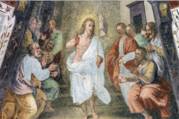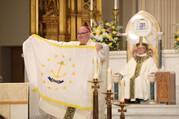Loading...
Click here if you don’t see subscription options
Click here if you don’t see subscription options

FaithVantage Point
The coronation of a British monarch is a ceremony that at several points bears a marked resemblance to the consecration of a bishop and which, in its essence and most of its origins, is essentially Catholic.

Arts & Culture
Books
A new study exploring the relationship between religion and the English monarchy by Catherine Pepinster explores the impact Elizabeth II and the monarchs that preceded her have had on the Church of England as well as on other faith traditions in their realm.

FaithScripture Reflections
A Reflection for Thursday of the Fourth Week of Easter, by J.D. Long-García

Arts & CultureIdeas
I would like to offer three anecdotes from my life that I hope will speak to what the Writers Guild of America is fighting for and why Catholics should care.

Politics & SocietyDispatches
Sidestepping reservations individual party members must have about being associated with the pomp and ceremony of a very anti-republican spectacle, Sinn Féin hopes to demonstrate diplomatic gravitas and a mature capacity to lead all Ireland.

FaithNews Analysis
Many Catholics like myself who have followed the development of synodality under Pope Francis have been convinced that the decision to open synod voting to non-bishops was all but inevitable.

FaithDispatches
Weddings historically had served as an opportunity to “evangelize and re-engage” young couples, but that chance was being lost when brides and grooms bypass the church altogether when planning their ceremony.

Politics & SocietyShort Take
The deeper kind of reporting that Evan Gershkovich was practicing when he was arrested in Russia is, in my mind, a practice of love.

FaithShort Take
When we listen to the resurrection stories during the Easter season, we often focus on what happened to Jesus. But it’s probably more important to look at what the resurrection does to the disciples.

FaithDispatches
While the Diocese of Providence flies relatively under the radar, it gained national attention in recent years in part because of the outspokenness of its outgoing bishop, Thomas Tobin.
